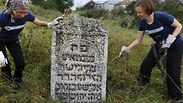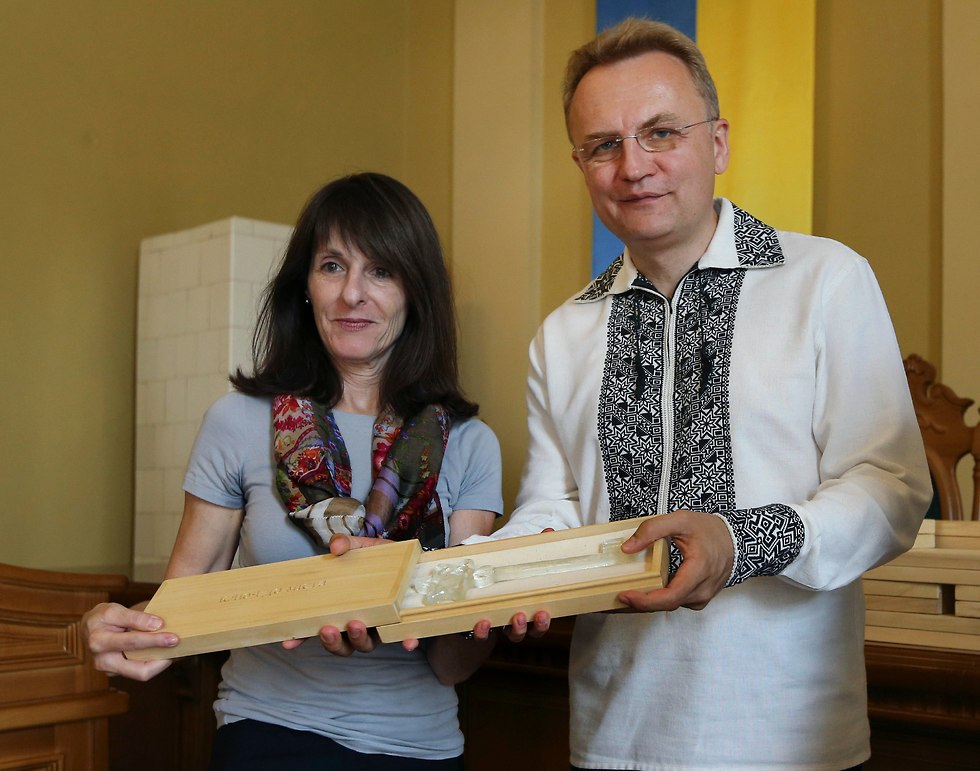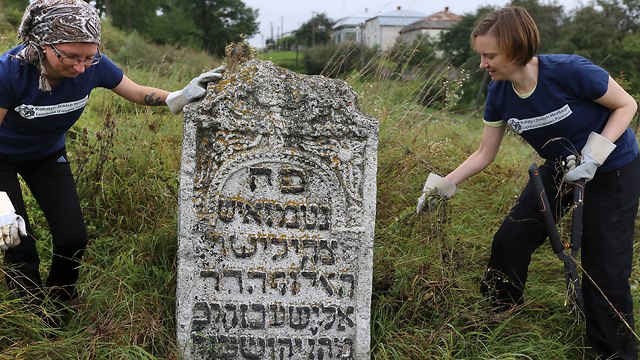
LVIV, Ukraine — The Ukrainian city of Lviv, once a major center of Jewish life in Eastern Europe, is commemorating the 75th anniversary of the annihilation of the city's Jewish population by Nazi Germany and honoring those working today to preserve what they can of that vanished world.
City authorities honored recipients during Sunday's ceremony with 75 sculptured glass keys modeled by an American artist on an old metal synagogue key that she found at a Lviv market. The ceremonies, including a concert amid the ruins of synagogues, come amid a larger attempt to revive the suppressed memories of the Jews who were once an integral part of life in the region.
Iryna Matsevko, deputy director of the Center for Urban History of East Central Europe and one of the organizers, said it was the first time the western Ukrainian city has acknowledged the efforts in such an extensive way.
She said it comes amid a growing consciousness in Ukrainian society of the need to remember the Jews who were annihilated by Nazi forces during their occupation of Eastern Europe, which occurred with the participation of local people in some cases. The new efforts have included Jewish history courses at universities, new research by young Ukrainian scholars and grassroots efforts by local teachers and other volunteers that otherwise get little attention. Volunteers have also worked to recover Jewish gravestones that were used to pave roads and return them to cemeteries.

Before World War II, Lviv and the surrounding area belonged to Poland. Then called Lwow, it was the third largest Jewish community in prewar Poland after Warsaw and Lodz, with most working as merchants, manufacturers or artisans. Before World War I, Lviv and the surrounding area were part of the eastern Galicia region of the Austro-Hungarian empire and the city was called by its German name, Lemberg.
In June 1941, Germany attacked the Soviet Union, its former ally. As soon the German forces entered the city they and their Ukrainian collaborators massacred Jews in the city and countryside. While occupying the area, Germans murdered Jews in the ghetto, the Belzec death camp and a forced labor camp, Janowska, with the final annihilation occurring in 1943, the anniversary that was being marked Sunday.
Of a population of about 150,000 Jews, only an estimated 1 percent survived.
In the postwar years, with Ukraine part of the Soviet Union, the memories of the murdered Jews began to vanish. Historian Omer Bartov has called the area a "land of memory and oblivion, coexistence and erasure, high hopes and dashed illusions."
The remembrance work is taking place as Ukraine finds itself mired in crisis and conflict following Russia's annexation of Ukraine's Crimean Peninsula and with a Russia-backed insurgency in the east. With Ukraine under attack, nationalism has been on the rise, with some lauding the Nazi-affiliated irregulars who fought against the Soviet Army in World War II. To what extent this has led to greater anti-Semitism is a matter of dispute, but many of those working in the area of Jewish remembrance feel that anti-Semitism is exaggerated and part of a Russian propaganda effort.
The glass keys are the work of New Mexico-based artist Rachel Stevens, who found a rusted synagogue key at a street market in Lviv in February while seeking remnants of Jewish culture in eastern Galicia as part of a research project.
She reproduced them in glass, which in Jewish tradition "represents the fragility of life," she said, explaining that the "glass synagogue keys became a tangible way for me to express my grief about the past and my hope for the future."
"The idea for this artwork seems almost mystically delivered to me," Stevens said.

















